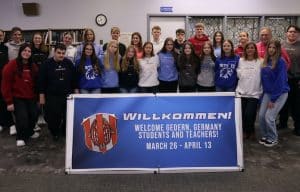Columbia development vote tabled
Those on hand to hear the fate of a proposed development near the Country Crossings subdivision in Columbia must wait two more weeks for a vote.
The vote for approval of the plan on Monday’s Columbia City Council agenda was tabled until the March 16 meeting for further consideration.
The Community Unit Plan Type B was brought before the council for discussion at the Feb. 18 meeting and drew a large crowd of residents who objected to various elements of the plan, mostly concerns about increased traffic on Gilmore Lake Road.
Before the scheduled vote Monday night, Columbia Director of Community Development Scott Dunakey noted he recently received more objections to the plan by residents neighboring the proposed development, enough to require a two-thirds supermajority vote to pass the plan.
Dunakey also addressed a concern from the Feb. 18 meeting regarding existence of an easement on Hill Castle Road to allow construction traffic. Dunakey confirmed that the access easement submitted for review by developer Marty Hubbard was vetted by city attorney Terry Bruckert and was found to satisfy requirements to allow construction vehicles to use the street.
Shortly after a motion to approve the plan was made, Ward IV Alderman Mary Ellen Niemietz stated she did not feel comfortable voting on the item without time to review it more thoroughly. Ward III Alderman Gene Ebersohl moved to table the motion until the next council meeting.
During the ensuing discussion, Dunakey noted the developer had made several concessions in response to concerns, explaining that the plan in front of the council was the fourth revision since an initial submission.
Ward II Alderman Mark Roessler noted the objections are “going to be the same with a new plan or with no plan,” adding that allowing construction in the area as zoned without the CUP would give the city “no leverage on anything” such as masonry requirements that are part of the proposed development.
Addressing Country Crossings residents in attendance, with whom aldermen met with over the past two weeks, Roessler told them the council “can’t fix your Gilmore Lake (Road) problem.”
Dunakey also explained there is “no mechanism in place” to require any developer to provide alternative street outlets in the current annexation area.
The motion to table a vote until the next city council meeting passed unanimously.
The meeting began with Columbia Mayor Kevin Hutchinson issuing a proclamation “Recognizing and Honoring Maurice Daniel Schneider On the Occasion of his 100th Birthday” on March 6.
In other Columbia happenings, road resurfacing began Monday as part of the Streetscape Project. Other work will begin soon, weather permitting, although the city is still waiting for delivery of decorative lights needed for the project. City engineer Chris Smith said he anticipates delivery sometime next week. The reason for the delay is unknown.
A building was razed at 124 S. Metter Avenue next to Metter Park last week. Dunakey said no decision has been made on specific future use of the lot, but he did confirm it will be part of Metter Park.
Sunset Overlook keeps liquor license
Columbia’s Sunset Overlook will keep its liquor license.
The Liquor Control Commission met Feb. 21 with the owners of Sunset Overlook in a hearing to determine the status of its liquor license as part of ongoing litigation between the establishment at 11604 Bluff Road and a group of neighboring citizens.
Representatives for both sides as well as members of Columbia government were on hand to provide information at the meeting, which lasted over 2.5 hours.
Attorney Van-Lear Eckert served as administrative law judge for the commission in place of Hutchinson, who typically serves as liquor commissioner but was recused for potential conflict of interest.
In his decision, released last Wednesday, Eckert determined Sunset Overlook is not “operating a lounge, tavern or pub in violation of C-1 Neighborhood district restrictions” and that it is “operating as a restaurant that serves and sells alcoholic liquor with meals.”
Complainants argued the validity of Sunset Overlook’s status as a “restaurant,” claiming that a large majority of business was from alcohol sales, not food, in a motion filed in November.
The decision noted that “percentage of food” is not defined by the State of Illinois or City of Columbia in order to establish the “principal business” of a restaurant.
Sunset Overlook owners Julie and Peter Ingold testified about the business’ food service, noting that patrons are seated at tables and provided menus and that the business has a “full kitchen on site.”
Julie Ingold also explained the food/liquor ratio submitted by the complainants was skewed. She explained that four people could order a drink but share a pizza, resulting in a lower percentage of food sold than alcohol.
Sean Mocaby, investigator for the Illinois Liquor Control Commission, testified that Sunset Overlook “is operating in compliance with their state license.”
Natalie Lorenz, attorney for the complainants, said her clients were “disappointed by the ruling” and “continue to believe Sunset Overlook is a bar located in a zoning district where bars are not allowed.”
Last month, the Illinois Fifth District Appellate Court upheld an earlier judgment in Monroe County Circuit Court that prohibits Sunset Overlook from selling or allowing patrons to consume food or drink outside, among other restrictions.






